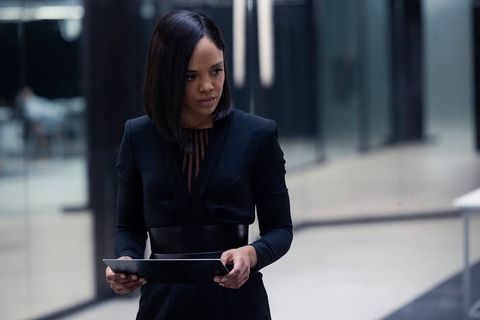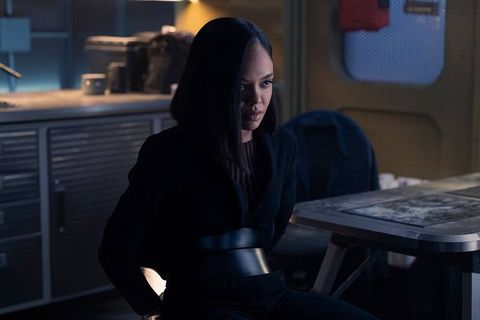Spoilers below.
It’s Charlotte Hale’s world; everyone else is just living in it. Or, in the case of Westworld’s latest episode, everyone else’s clones are just living in it, unknowingly under her control.
Season 4, episode 4 concluded with another classic Westworldian rug-pull, this time revealing that Hale (Tessa Thompson) has achieved her grand scheme of replacing humans with hosts—or so it seems. And they’re all under her command. One of them is poor Caleb (Aaron Paul), who realizes that he, in his current form, is the 278th copy of the original human Caleb, who actually died 23 years ago. Now, this isn’t the classic “OMG, he’s been a robot all this time!” kind of gotcha Westworld has hit us with in past seasons. Caleb really was a human when we first met him. But he was infected with a parasite by the flies at the Delos labs, which essentially made him vulnerable to mind control and boggled his memories. Hale ends up experimenting on him, but he doesn’t know that because each new iteration of Caleb is programmed with his real-life memories. He thinks he’s still his true human self with a bit of brain fog; in reality, he’s a copy working through his programming. Yikes.
Thompson explains Charlotte’s manipulation of Caleb to ELLE.com: “She’s been experimenting, essentially, on him for a really long time, and, yeah, it’s unsavory. And yet we have seen this corporation, Delos, do that with host-kind over the course of the last three seasons. And the irony, of course, is that Charlotte Hale [as a human] was one of the big proponents of that. And so that [is] like a sweet justice, in a way, that Hale is after.”
Remember, this version of Charlotte was introduced last season as a new host with Dolores’ programming, but clearly she has evolved into her own being with her own motivations and perspectives since then. “The Charlotte Hale that we meet in this season in some ways has been around for a long time, has been trying at a vision of the world to various degrees of success,” Thompson says. “But I would say she’s a mastermind. She’s a petulant god. Yeah, she’s a new creature unlike anything we’ve seen from her previously.”
Part of that is her desire for, put it in simple terms, world domination. Where did that ambition come from? Is it just an urge for revenge on humans, who have taken advantage of hosts in the past, or is it deeper than that? Thompson thinks it has to do with Hale’s “bone to pick” with humankind, and her unyielding determination to pick it. “I think it also has to do with a righteousness in the sense that she really feels her vision of this new world makes the most sense, that there’s this idea that Earth, that the land of humans, is corrupt and beyond saving and salvaging. And I’m not entirely sure that she’s wrong when you look at the times that we live in. Increasingly, you think, ‘Will we make it? Can we make it? Will we get better?’”
Perhaps there’s a bit of a savior complex behind her plan too. “I think she is trying to, for her people, for host-kind, find a utopia for them,” Thompson adds. “As misguided as she is in her approach, I think she has some ideas that are founded on some real truth. And I do think, as twisted as it is, it comes from a place of real love, actually, for the limitless possibilities of the sentience of this new being in host form. So I don’t know. I think whenever you’re playing someone that is, quote, ‘the villain,’ you have to try to find their humanity, their core, their center. And it’s challenging and fun to do that with her.”
As terrifying as Hale’s grand plan may be, Thompson seemed to have a lot of fun with this leg of her journey. For one, she got to share more scenes with Paul, which was “such a pleasure,” she says. “He’s so tremendous, he’s good in that scene and every scene he’s in. And he’s just fun to be around, too, which is a joy, especially when you have long days and you’re doing stuff that’s challenging.”
And part of that fun, surprisingly enough, came from watching Paul perform Caleb’s WTF moment in this week’s episode. “It was a joy to watch such a gifted actor like Aaron Paul get to digest this information and to realize that the reality that he knows and understands is actually maybe not true,” Thompson says, smiling.
Hey, I get it; part of the ride of watching Westworld is the pangs of confusion, the “What on Earth just happened?” questions you ask yourself as the characters you’re watching are asking themselves the same thing. “I think one of the things that feels so exciting about the show is to get to watch characters who don’t entirely understand the worlds in which they find themselves,” Thompson says. “I think there is a very human parallel, which is that we don’t always understand the world in which we find ourselves. Certainly our emotional landscape. Life is chaotic. We don’t always have control over our reality.”
Consider it a mindfuck—or as Thompson puts it, “a beautiful chaos”—for both the viewers and the characters.
In the end (of this episode, at least), Charlotte wins; and with everyone’s wills at her own fingertips, she seems unstoppable. But she’s not invincible. When asked about Hale’s weaknesses, Thompson points to “a recklessness, a lack of patience, a steely determination, that maybe impedes her from really actually being able to take in what other people say.” That was probably Hale’s flaw back when she was flesh and blood too, she adds.
“So I think that’s also a fun irony of the show, which is that we can evolve and change, but there is something in our core nature that maybe is unshakable, that we are bound to meet it at every turn,” Thompson says. “I think that’s the thing that’s fascinating about Hale and, more broadly, what the show posits, in general, about our nature as humans.”
This content is created and maintained by a third party, and imported onto this page to help users provide their email addresses. You may be able to find more information about this and similar content at piano.io






